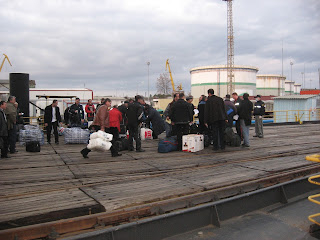 Off the ship; and now what?
Off the ship; and now what?
So now we were free; we, the Tbilisians Archi and Tony, had arranged for a ride from friends that we had made, but after disembarking and waiting for a couple of hours, and there being no sign of any vehicles disembarking we decided to get a bus or a taxi.
From the ship to the harbour gate is about a kilometre across a rough, wet and grimy path, but fortunately there was a shuttle; at the dock gates Tony negotiated a taxi for the three of us, $120 for the five hour ride to the capital; a bus might have been $15 each, but it was late, we were hungry and anxious to move, so we climbed into a geriatric, red Opel and clunked off along the most appalling road that I have seen in my life.
First, however would be dinner, and we pulled up outside a non-descript that the driver knew and went into to a smoky, dark, cavern-like and utterly wonderful restaurant. This region of the country is not wealthy, and it shows, but at each table groups were eating, drinking and toasting with abandon, and so we followed suit.
Georgian cuisine is not exactly light-weight or possibly uber-nutritious, but is it delicious, and an hour later, after a splendid meal of kebabs, katchapouri (a sort of stuffed cheese pie) and khinkale (like perogies, but large filled with meat and a broth, to be eaten with care), a flagon of wine, and toasts to our families, countries (even Russia), peace, long-life, our new friendship and the wisdom of voters we headed out into the night, and headed East.
At about 2,00am, we slide into Tbilisi, still surprisingly awake, and drove through the old town, utterly gorgeous in pastel lights highlighting its absorbing architecture and to the Marriott where I now sit in a degree of comfort well removed from the Greifswald. An East German ship will remain an East German ship regardless of falling walls or reunified countries. Until she heads to the knackers’ yard, she will remain resolutely East German.
